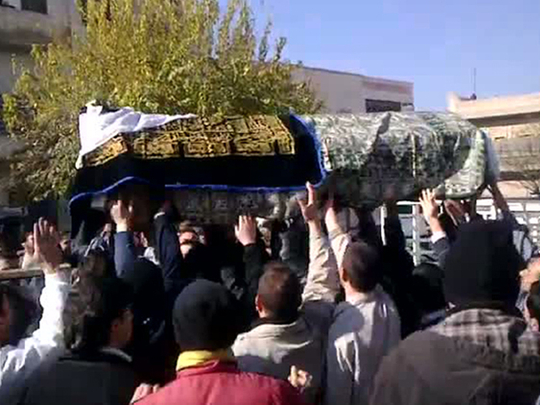
Kabul: A bombing in Afghanistan Wednesday took the toll from just over 24 hours of bloodshed to 78 dead as officials blamed Pakistanis for the worst attack, accusing them of trying to whip up Iraq-style sectarian violence.
Nineteen civilians, including seven women and five children, were killed by a roadside bomb in southern Afghanistan's troubled Helmand province on Wednesday, underscoring enduring instability after 10 years of war.
That came as funerals took place for 59 people killed in unprecedented bombings against Shiite Muslims in Kabul and Mazar-i-Sharif a day earlier, which Afghan officials blamed on Pakistani militants.
They accused the militants of trying to further destabilise Afghanistan with sectarian violence in a country already wracked by a decade of conflict between foreign and government troops and Taliban-led insurgents.
Seven women from one family
Giving details of the Helmand bombing, provincial security force commander Mohammad Ismail said 19 people, including seven women and five children were killed. The women were all from the same family.
The blasts, for which there was no immediate claim of responsibility, came as the civilians travelled from provincial capital Lashkar Gah to Sangin district, historically one of the most troubled in Afghanistan.
Parts of Helmand remain highly unstable although Lashkar Gah was brought under the overall control of Afghan forces in July and three other districts are due to shift from Nato to Afghan security control within weeks.
Investigators are now trying to find out who was behind Tuesday's attack in Kabul, which killed 55, and another almost simultaneous one in Mazar-i-Sharif that killed four as Shiites marked the Day of Ashura.
The Taliban have denied responsibility. An Afghan official said the bomber who attacked the Kabul shrine was a Pakistani affiliated to Pakistan's extremist Lashkar-i-Jhangvi group, which has been blamed for killing thousands of Pakistani Shiites.
The faction linked to Al Qaida has not previously claimed responsibility for any attacks in Pakistan's neighbour Afghanistan. Officials and experts suggested that if any Pakistani militants did orchestrate the attacks, then elements in the Afghan Taliban may have helped facilitate them.
The Kabul attack on the holiest day in the Shiite calendar marked the first on a key religious day in Afghanistan.
The twin blasts have prompted fears that Afghanistan could see the sort of sectarian violence that has pitched Shiite against Sunni Muslims in Iraq and Pakistan.
President Hamid Karzai scrapped a planned trip to Britain, flying back to Afghanistan for an emergency meeting with security chiefs after attending Monday's Bonn conference on his country's future.
In Kabul, many of those killed in the shrine bombing were buried amid emotional scenes Wednesday. Several hundred people marched through the west of the city chanting "God is great" with two of the bodies, an AFP photographer said.
Kabul police spokesman Hashmat Stanikzai said that while they had been prepared for violence, the funerals had passed off peacefully so far. The US embassy confirmed that an American citizen was among those killed in the Kabul attack but gave no further details.
Sediq Sediqqi, a spokesman for the Afghan interior ministry, said the attack was the work of "the Taliban and their associates", adding that no-one else carried out such suicide attacks in Afghanistan.
An Afghan security official speaking on condition of anonymity said the bomber was from Kurram district in Pakistan's border region and was connected to Sepah-i-Sahaba, a Lashkar-i-Jhangvi offshoot.
Afghans traditionally blame Pakistanis for fuelling much of the violence in their country. Lashkar-i-Jhangvi was one of the groups involved in the kidnap and beheading of Wall Street Journal reporter Daniel Pearl in Pakistan in 2002.
The security official said the attack aimed to "inflame sectarian violence in Afghanistan" but gave no evidence. A Western security official also suggested Pakistani involvement but stressed it was not clear whether this was "institutional", referring to reported links between militants and Pakistani intelligence.
"We're particularly looking at TTP (Tehreek-i-Taliban, the Pakistani Taliban) although at the moment we don't have any proof," he said. A Pakistani security official speaking anonymously said Lashkar-i-Jhangvi was closely associated with the Pakistani Taliban.












